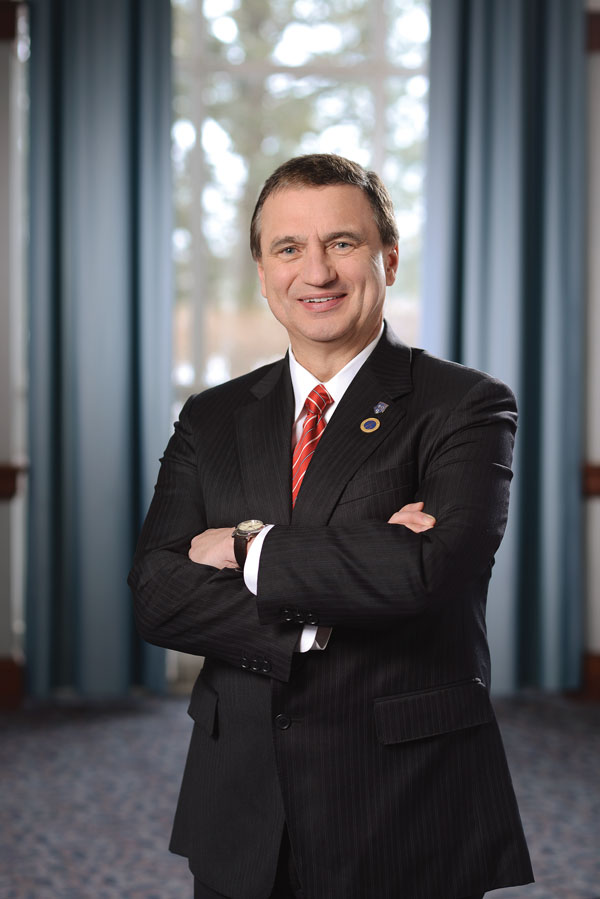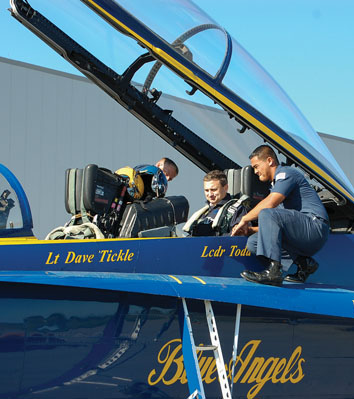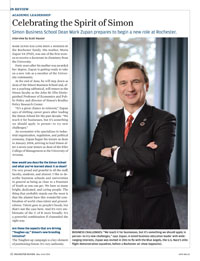In Review
 BUSINESS CHALLENGES: “We teach it for businesses, but it’s something we should apply in person—to try new challenges,” says Zupan. A noted business education leader with wide-ranging interests, Zupan was invited in 2011 to fly with the Blue Angels, the U.S. Navy’s elite flight demonstration squadron, before a Rochester air show (below). (Photo: John Smillie)
BUSINESS CHALLENGES: “We teach it for businesses, but it’s something we should apply in person—to try new challenges,” says Zupan. A noted business education leader with wide-ranging interests, Zupan was invited in 2011 to fly with the Blue Angels, the U.S. Navy’s elite flight demonstration squadron, before a Rochester air show (below). (Photo: John Smillie)Mark Zupan has long been a member of the Rochester family. His mother, Maria Zupan ’64 (PhD), was one of the first women to receive a doctorate in chemistry from the University.
Forty years after his mother was awarded her degree, Zupan is getting ready to take on a new role as a member of the University community. At the end of June, he will step down as dean of the Simon Business School and, after a yearlong sabbatical, will return to the Simon faculty as the John M. Olin Distinguished Professor of Economics and Public Policy and director of Simon’s Bradley Policy Research Center.
“It’s a great chance to reinvent,” Zupan says of shifting career gears after leading the Simon School for the past decade. “We teach it for businesses, but it’s something we should apply in person—to try new challenges.”
An economist who specializes in industrial organization, regulation, and political economy, Zupan began his tenure as dean in January 2004, arriving to lead Simon after a seven-year tenure as dean of the Eller College of Management at the University of Arizona.
How would you describe the Simon School and what you’ve learned about it as dean?
I’m very proud and grateful to all the staff, faculty, students, and alumni. I like to describe business schools and universities in general as being as close to a Fountain of Youth as you can get. We have so many bright, dedicated, and caring people. The thing that probably stands out the most is that the alumni have this wonderful combination of world-class talent and groundedness. Talent goes to people’s heads, but that’s not the case here. And it’s very emblematic of the U of R more broadly. It’s a powerful combination if channeled the right way.
 (Photo: University Communications)
(Photo: University Communications)Are those the aspects that are driving “Toughen up,” Simon’s new branding initiative?
The Toughen up campaign is a key element of positioning Simon. It’s very authentic. And we’ve been pleased with how it’s been received by students, recruiters, alumni, faculty, and staff. It reflects our can-do spirit, our willingness to try new things. The defining moment for me was meeting with an alumna from 2004 who’s now the youngest senior manager at ANZ Bank in New York City. When we asked for her feedback, she said, “You’ve nailed it. I’ve been through hell and back, four different firms over the years of the downturn on Wall Street. The Simon education prepared me incredibly well, but it also took great fortitude and resilience.”
Does it resonate inside Simon as well?
It’s had the most enthusiastic faculty reception, unanimous approval, of anything I’ve been involved with in my 10 years at Simon. Importantly, it’s a call to action for faculty, staff, and alumni—that all of us need to raise our game.
What does the future hold for Simon?
We have five key goals. One is that because the full-time MBA still gets so much of the ranking spotlight we have to raise our game in terms of scholarship support, branding, curriculum, and program management.
Second is to develop an impactful set of undergraduate business degree offerings in partnership with Arts, Sciences & Engineering. These offerings were launched two years ago as the Barry Florescue Undergraduate Business Program in recognition of the pivotal support that University Trustee Barry Florescue ’66 has provided.
Third is growing and attracting the next generation of faculty. Thanks to the generosity of alumni and friends, we’ve raised 10 new professorships since the inception of The Meliora Challenge.
Fourth is finding other programmatic ways to support the educational enterprise. With applications to full-time MBA programs declining since 2007, we have to find other programs that play to our strengths and build distinction. That’s where partnerships with the Medical Center and the Hajim School of Engineering & Applied Sciences come in. And that’s where specialized master’s degrees in finance, marketing, medical management, accounting, and pricing come in.
And the fifth leg of this five-legged stool is fundraising. We have nearly 470 George Eastman Circle members. And as of this spring, we are at nearly $67 million committed toward our $85 million target for The Meliora Challenge.
What have been the challenges over the past 10 years?
In a marketplace where many business schools have been losing money, Simon has had an endowment draw of no more than 5.5 percent for four consecutive years.
What have been some of the biggest changes academically or programmatically for Simon?
We’ve become more diversified as an educational institution—in terms of academic programs—and thereby, have achieved record enrollments. We are positioning Simon for growth by playing to our strengths in analytic, economics-based education and the University’s growing emphasis on data science, one-year MS programs in finance, accounting, medical management, technical entrepreneurship—and new in April, a partnership with UBS to provide a wealth management master’s program in Switzerland.
For the past five years, you’ve worked to establish a presence in New York City. What prompted that?
Two MBA students—one from Taiwan and the other from South Africa—suggested it as part of an annual competition we have for the best idea to improve Simon. Their insight was that Simon has had academic programs in Switzerland, Holland, and Australia, but that New York City was much closer and strategically appealing. And so it set in motion a major conference there—our fifth annual conference takes place this May. We’re also offering two programs for working professionals in New York City whereby students come to our Times Square site every other weekend to pursue a one-year MS in either finance or management.
What are you most proud of about your tenure?
I’m a big believer in a Lao-Tzu quote that the mark of effective leadership is when people say, “We did it ourselves.” I think that’s what we have here at Simon. It’s more than just a can-do spirit but a thirst for inventing the future. I’m immensely proud of our alumni, faculty, and students, and their willingness to make a difference embodying that Simon spirit every day in their careers and their lives.

